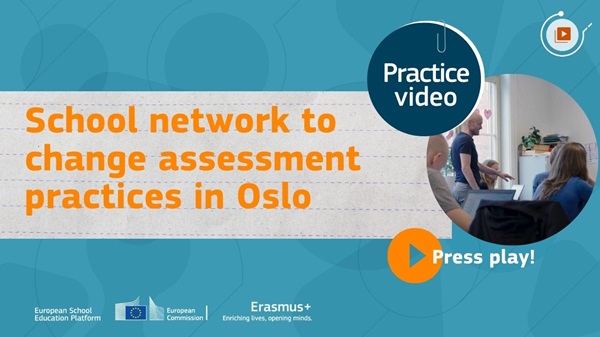School network to change assessment practices in Oslo

Good feedback focuses on certain frameworks, such as structure, language and so on, without pushing the student too much. You have to know the students’ existing level. If you are giving feedback to a grade 2 student, don’t expect the level of a grade 6 student, but maybe grade 3 or 4, and don’t push too much, push a little and bit by bit. If you push too much there is far too much stress and you become unmotivated from having too much pressure on yourself. In all subjects really.
In 2019, we received a political order in Oslo municipality for more secondary schools to work less with grades, and we started a network of eight schools that have been working on this for three years.
The important thing for us as a school is that the Oslo School Agency has facilitated a project together with Inland Norway University of Applied Sciences (INN) which they have maintained over time, and they have consulted with us on how to set up the various network meetings. In addition, it has been valuable to meet students and teachers from other schools who are trying to figure out some of the same things we find challenging. I believe this may have been the most important for us in helping us achieve development at our school.
We at INN University learn a lot from participating in development processes together with students, teachers and school leaders from schools in networks in Oslo. When we present research and theory, we can sometimes be undetailed and we can easily end up with less wise practice. For practice to become wiser it’s about fine-tuning. It's about wisdom in everyday life. It is about what kind of basic understanding one has of the students' and teachers' roles in school. When we get to talk to all parties, with students, teachers, school leaders, we understand better what we need to do more research on, how we can communicate theory and research even smarter, so that it results in the desired development in schools.
The way teachers give feedback matters a lot. It might be positive negative, copy-paste. If it's bad feedback that is either copy-paste or you just disagree with it or it doesn’t make sense, then you just put it aside like it's not there. When I got identical feedback as most of the students, I ignored it. I just looked at it and then I put it down. I haven't looked at it since. So it matters a lot how you write feedback and how personalised it is for whether you consider using it later.
One thing I also think is good and which some teachers do, is that they vary a little in how they give feedback. Sometimes there is written feedback, sometimes they give it orally and other times they record a video in Norwegian, for example. Then the teacher goes through what you have written and highlights some of it. Then I think feedback immediately becomes a bit more interesting. If there is a bit of variation you may also become more interested in using it and working on it.
The most important change for me in terms of how I teach now and in the past is that I am much more concerned with the process and what the students do along the way and not so concerned with the final product. We still have the final product and a goal to reach, but the main impression I get of what the students need help with, what guidance they need, what they can and cannot manage, I get during the process. I have become much more focused on following up the students along the way. And then, of course, we use different ways to achieve this.
I have older siblings who have attended Fagerborg school and received grades after each test or assessment. I kind of wanted that at first, because I thought it was interesting to get numbers to sort out what level I was at. Now I've only experienced getting grades during each semester, and I think it works much better. I feel that the teachers see my entire development from the start of the six months to the end because that's a lot of time to develop.
What we have seen is that assessment practice is about curriculum work and good teaching. The new curricula require that you focus on relevance, the student's interests and that you work creatively with the subjects. If teachers do that, it will also affect their assessment practice.
Additional information
-
Education type:School Education
-
Evidence:N/A
-
Funding source:Local funding
-
Intervention level:N/A
-
Intervention intensity:N/A
-
Participating countries:Norway
-
Target audience:TeacherStudent TeacherHead Teacher / PrincipalTeacher EducatorGovernment staff / policy maker
-
Target audience ISCED:Lower secondary education (ISCED 2)Upper secondary education (ISCED 3)
